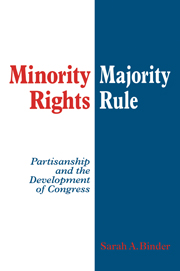Book contents
- Frontmatter
- Contents
- List of tables and figures
- Preface
- 1 The partisan basis of procedural choice
- 2 The evolving concepts of House and Senate minority rights
- 3 Procedural choice in the early Congress: The case of the “previous question”
- 4 Allocating minority rights in the House, 1789–1990
- 5 Institutionalizing party in the nineteenth-century House
- 6 Stacking the partisan deck in the twentieth-century House
- 7 Inherited rules and procedural choice in the Senate
- 8 Assessing the partisan theory
- Appendix 1 Summary of changes in minority rights
- Appendix 2 Measuring congressional workload
- Appendix 3 Measuring party behavior
- Bibliography
- Index
1 - The partisan basis of procedural choice
Published online by Cambridge University Press: 10 December 2009
- Frontmatter
- Contents
- List of tables and figures
- Preface
- 1 The partisan basis of procedural choice
- 2 The evolving concepts of House and Senate minority rights
- 3 Procedural choice in the early Congress: The case of the “previous question”
- 4 Allocating minority rights in the House, 1789–1990
- 5 Institutionalizing party in the nineteenth-century House
- 6 Stacking the partisan deck in the twentieth-century House
- 7 Inherited rules and procedural choice in the Senate
- 8 Assessing the partisan theory
- Appendix 1 Summary of changes in minority rights
- Appendix 2 Measuring congressional workload
- Appendix 3 Measuring party behavior
- Bibliography
- Index
Summary
As it is always in the power of the majority, by their
numbers, to stop any improper measures proposed
on the part of their opponents, the only weapons by
which the minority can defend themselves against
similar attempts from those in power are the forms
and rules of proceeding.
Thomas Jefferson, 1801It is but too evident, that when the right of debate is
taken away – when a majority can … screen them-
selves from exposure (however weak, arbitrary or
wicked their measures may be) by sealing the lips of
a minority on the floor of congress, we may soon
bid adieu to our best and dearest rights. It is laying
the axe at the very root of the tree of liberty.
Representative Archibald McBryde, 1810Compiling a manual of parliamentary practice in 1801, Thomas Jefferson emphatically recognized the importance of procedure in securing the rights of minority party members in the U.S. Congress. In a democratic political institution, majorities would achieve their favored outcomes by taking advantage of their superior size, and minorities would resist by availing themselves of protective rules to amend, delay, or obstruct the majority's agenda. Yet, as suggested by Representative Archibald McBryde (Federalist-North Carolina) in a public letter to constituents just a few years later, the portrait of congressional rules as stable guarantors of the minority party's right to participate meaningfully in the legislative process is deceptive.
- Type
- Chapter
- Information
- Minority Rights, Majority RulePartisanship and the Development of Congress, pp. 1 - 18Publisher: Cambridge University PressPrint publication year: 1997



